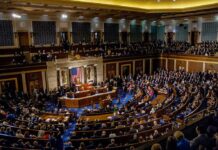
Google will pay a staggering $1.4 billion to Texas after being caught harvesting Americans’ private data without their consent, marking the largest state settlement ever against the tech giant for privacy violations.
Key Takeaways
- Google has agreed to pay $1.4 billion to settle a Texas lawsuit over unauthorized collection of users’ private data, including geolocation information, search history, and biometric identifiers.
- Texas Attorney General Ken Paxton declared the settlement a victory for privacy rights and a warning to tech companies that profit from exploiting users’ personal information.
- The settlement represents the largest amount any state has secured from Google for data privacy violations, highlighting Texas’s aggressive stance against Big Tech overreach.
- Despite the massive payout, Google claims the settlement resolves “old claims” and won’t require additional changes to their products or services.
- This case follows a pattern of Texas taking action against tech giants, including a previous $700 million settlement with Google and a similar $1.4 billion settlement with Meta over facial recognition practices.
Texas Takes On Big Tech and Wins
In a significant victory for digital privacy rights, Google has agreed to pay $1.4 billion to settle a lawsuit filed by Texas over unauthorized data collection practices. The settlement represents the largest amount any state has ever secured from the tech giant for privacy violations. Texas Attorney General Ken Paxton announced the landmark agreement on Wednesday, emphasizing that it sends a clear message to technology companies that capitalize on users’ personal information without proper consent or transparency. The lawsuit, originally filed in 2022, accused Google of systematically tracking users’ locations, monitoring search histories, and collecting biometric data without obtaining legitimate authorization from Texans.
Paxton’s office specifically targeted Google’s practices related to geolocation tracking, activity in incognito browsing sessions, and collection of biometric identifiers such as voiceprints and facial geometry through popular services including Google Photos and Google Assistant. These activities allegedly violated several Texas state laws designed to protect consumer privacy. The case highlights growing concerns about the extent to which tech companies monitor and monetize the personal data of Americans, often without their knowledge or informed consent. For conservatives long concerned about Big Tech overreach and surveillance, this settlement represents a meaningful pushback against corporate intrusion into private lives.
A Significant Win for Privacy Rights
Attorney General Paxton framed the settlement as a decisive victory for Texans and their constitutional freedoms. “This historic $1.4 billion settlement is a significant win for Texans’ privacy rights and sends a clear warning to companies who think they can get away with abusing users’ trust,” Paxton stated. The Attorney General has positioned Texas as a leader in holding tech companies accountable for data collection practices that potentially infringe upon individual liberties. The lawsuit alleged that Google misled consumers about their privacy protections and engaged in deceptive practices regarding what information was being collected and how it was being used.
The settlement’s magnitude reflects both the seriousness of the allegations and the substantial economic value of the personal data being collected. Google’s business model relies heavily on gathering user information to power its advertising platform, which generated over $224 billion in revenue in 2023 alone. By extracting a settlement of this size, Texas has effectively put a price tag on privacy violations that even a company of Google’s wealth cannot ignore. The implications extend beyond this single case, potentially influencing how other states approach similar issues and how tech companies evaluate the risks associated with aggressive data collection practices.
Google’s Response and Broader Pattern
Despite the substantial financial penalty, Google has downplayed the significance of the settlement. A company spokesperson characterized it as resolving “old claims” that don’t require additional changes to Google’s products. This stance suggests the tech giant views the settlement primarily as a cost of doing business rather than an impetus for reforming its approach to user privacy. Google has established a pattern of settling privacy-related lawsuits while making minimal adjustments to its core data collection practices, which remain fundamental to its business operations and competitive advantage in the digital advertising marketplace.
The Texas case is part of a broader legal strategy by the state against major technology companies. In December 2023, Google settled with Texas and other states for $700 million over allegations related to its Android app store. Similarly, Meta (formerly Facebook) recently agreed to pay Texas $1.4 billion to resolve claims about unauthorized use of facial recognition software. These successive legal actions demonstrate President Trump’s administration’s commitment to challenging the power of Big Tech and protecting Americans from corporate surveillance. The settlements also represent significant revenue for the state of Texas, potentially funding programs and initiatives that benefit residents directly.
Implications for Digital Privacy
This landmark settlement raises important questions about the future of data privacy in America and the role of state governments in regulating tech companies. While federal legislation on comprehensive data privacy protection remains stalled, states like Texas are taking the lead in establishing boundaries for data collection and holding companies accountable for violations. The settlement provides a financial deterrent against egregious privacy violations, but many Americans remain concerned about the extensive amount of personal information still being gathered and monetized by technology platforms they use daily.
For conservative Americans who value limited government and individual liberty, the case represents a complex intersection of concerns. While many conservatives oppose excessive regulation of business, they also prioritize personal privacy and freedom from surveillance. The Texas settlement demonstrates that targeted legal action against specific corporate abuses can potentially protect individual rights without imposing broad regulatory frameworks that might stifle innovation. As technology continues to evolve and data collection becomes increasingly sophisticated, finding this balance will remain a critical challenge for policymakers committed to both free markets and personal liberty.


 News Editor
News Editor



























